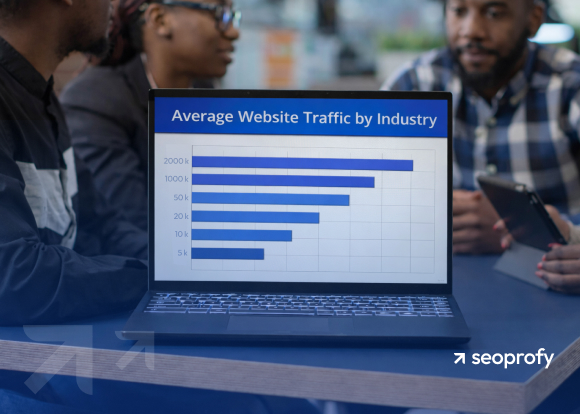Let’s dive deeper into SEO for lawyers to ensure the constant flow of clients to your website and establish a strong personal online brand for your law firm! Follow the tips from our ultimate guide to level up your business and overcome the competition!
Persuading algorithms that you’re worthy of reaching the top of the search results is as challenging as dealing with the most complicated cases in a court. Fortunately, in our guide to SEO for lawyers, you’ll find useful tips and tricks that will significantly simplify this process. We’ll lead you through the digital jungles to ensure a stable growth of your business and revenue.
- Small law firms spend up to $5,000 per month on SEO, while larger firms may invest as much as $20,000.
- Organic search ensures nearly 66% of call conversion in the legal industry.
- An efficient SEO campaign guarantees an impressive 526% ROI for a law firm over a three-year period.
- The search engine optimization for a legal company’s website involves many complex processes, including link building, keyword research, and creation of high-quality content.
What Is Law Firm SEO?
Law firm SEO is the process of optimizing a law firm’s website to rank higher in search engine results for relevant keywords. These terms may be generally related to your niche (e.g., “attorney” or “law firm”) or be more specific for a particular location or niche (e.g., “family lawyer Chicago” or “NYC injury attorney”). With the help of an efficient SEO strategy, you ensure that a person will see your website when they enter this or that keyword in Google or other search engines.
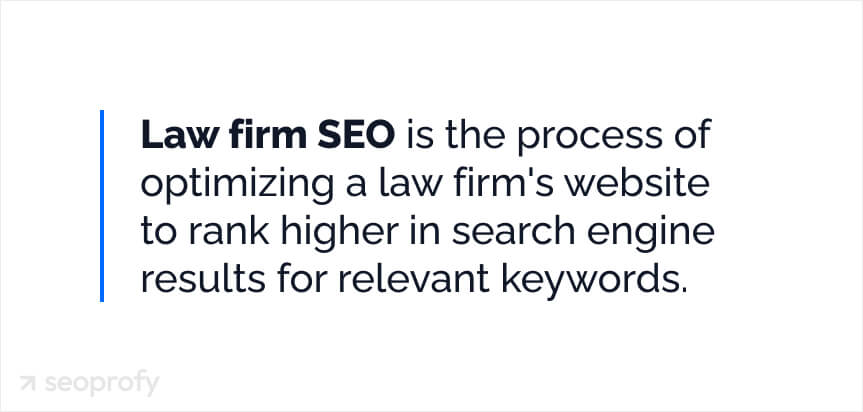
However, search engine optimization doesn’t stop at driving more traffic. With high-quality content and technical website optimization, time-tested SEO practices can help you convert visitors into loyal clients.
In addition, SEO isn’t limited solely to your website. When someone searches for a lawyer, they might also check out a law firm’s listings on directory sites and review platforms to see what others say. Optimizing and updating your company’s Google Business Profile is another aspect of law firm SEO practices.
With all the different pieces that go into a full-fledged SEO campaign for law firms, the potential advantages are extensive. But what specifically makes SEO so valuable for lawyers looking to grow their practices?
Why Is SEO So Important for Lawyers?
SEO gives a sustainable way to improve your law firm’s website visibility. Consider that 75% of users visit two to five sites before they reach out to a lawyer. And the majority of people opt for the websites that are on the first page of the search results. So, if you want your attorney business to grow, you need to be as close to the top as possible. Eventually, it’s surely worth including SEO spending in your law firm’s marketing budget.
Additionally, consider that inquiries for legal services online often reach truly staggering numbers. For example, there are more than 600,000 monthly searches with keywords that contain “lawyer near me”:
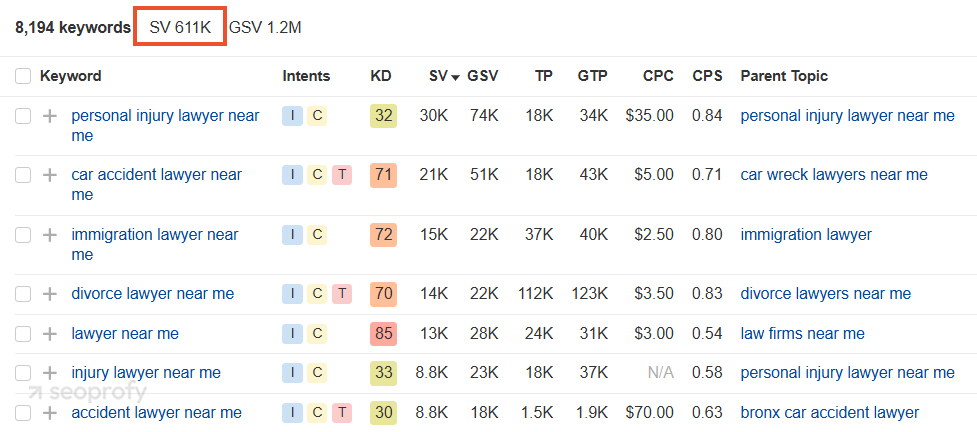
Additionally, search engine optimization can have a great impact on your revenue. According to our legal marketing statistics, organic search drives nearly 66% of call conversions in the legal industry.
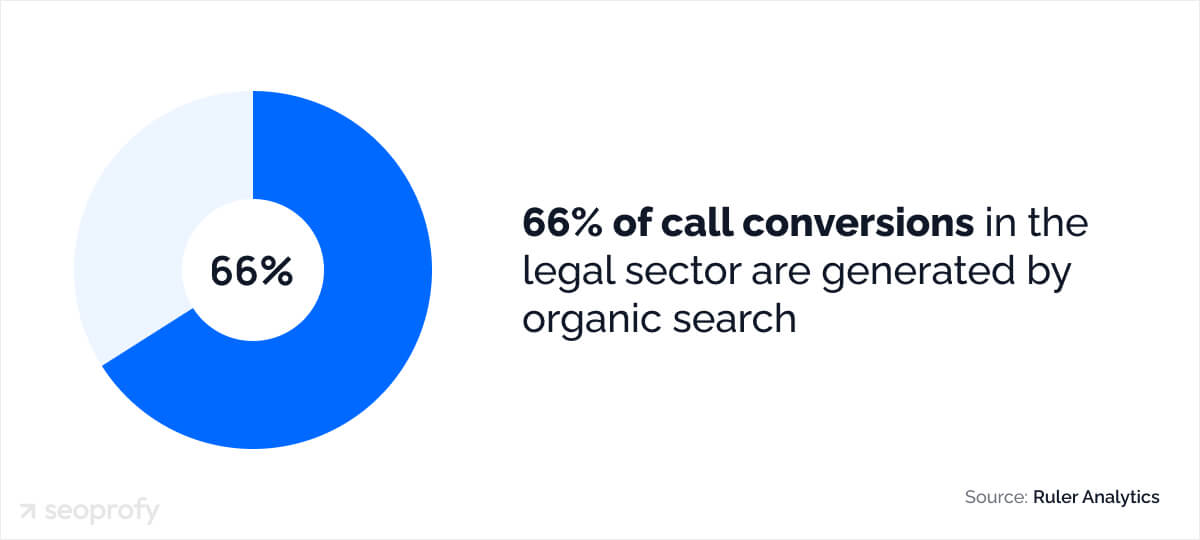
The long-term benefits are even more impressive. On average, a law firm can expect a whopping 526% ROI from SEO over a three-year period, with some firms realizing as much as a 266% increase in cases within the first year alone.
If we compare these results to traditional ads and social media, their effectiveness is much harder to track. They help build brand awareness, but still struggle with direct client acquisition. With efficient SEO, however, you can reach people who are actively searching for legal services. This targeting helps attract high-quality leads and increase conversion rates.
However, many firms often consider paid advertising, like Google Ads, as another digital marketing strategy. So, let’s take a closer look at these two channels.
SEO vs. Paid Ads for Lawyers
Both paid advertising and SEO have their merits. The first one offers instant results. With platforms like Google Ads, you can bid on keywords and have your firm’s ads displayed at the top of search engine results pages.
However, you also have to pay when someone clicks on your ad. Further, the more competitive the keywords, the pricier the clicks get. In fact, for some competitive legal keywords, the cost per click can reach $300.
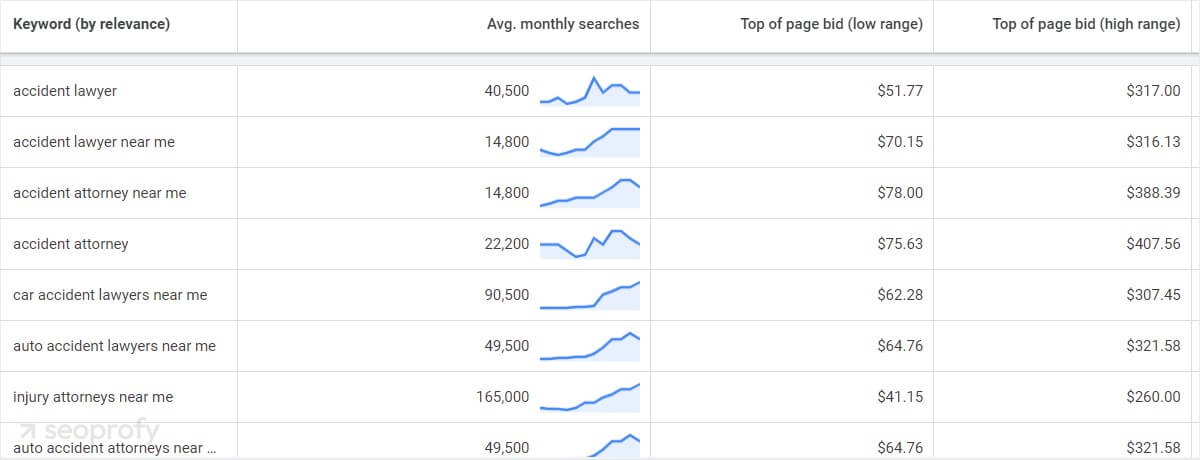
What’s more, as soon as you stop paying, your traffic immediately disappears.
On the other hand, the fruits of your legal SEO efforts compound over time. Once you’ve earned a coveted spot on the first page for your target keywords, you’ll continue to reap the benefits of organic traffic and lead generation with minimal maintenance.
What’s even better: SEO tends to drive higher conversions than paid ads. Data shows that organic visitors convert at a rate of 4%, compared to just 1.8% for paid traffic.
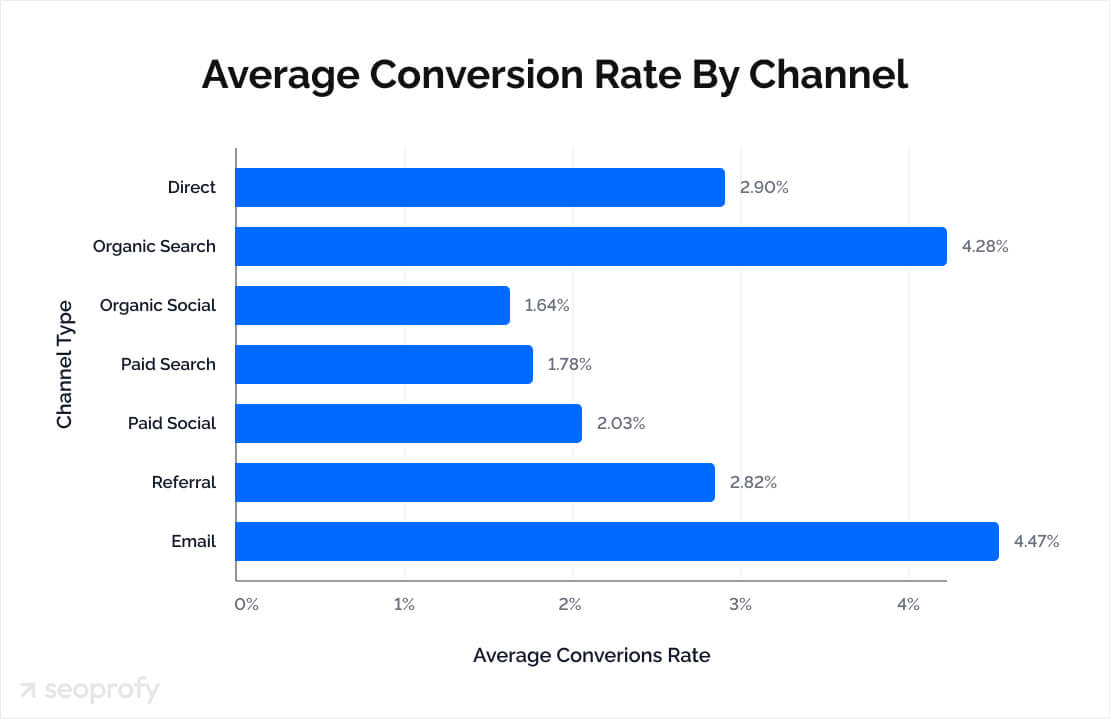
Now that you understand the difference between these channels and their possible impact on your revenue, let’s summarize the pros and cons of each for your law firm:
| Benefits of SEO | Drawbacks of SEO |
|
|
| Benefits of PPC | Drawbacks of PPC |
|
|
While paid ads certainly have their place in marketing, relying solely on this approach for a high-cost industry like legal services can drain your budget. Building a strong local search presence through law firm SEO may be more beneficial for long-term results.
Look for ways to balance SEO and PPC marketing tactics. You might begin with a stronger focus on PPC, increase your SEO efforts over time, and then reduce your PPC spending as your organic reach grows.
If you’ve decided to focus on SEO as your main digital marketing strategy, let’s look at the major factors that impact your search engine rankings.
Lawyer SEO Ranking Factors
Search engines like Google use complex ranking algorithms that evaluate hundreds of different factors. However, some factors carry much more weight than others on law firm websites. Here are the major ones to focus on:
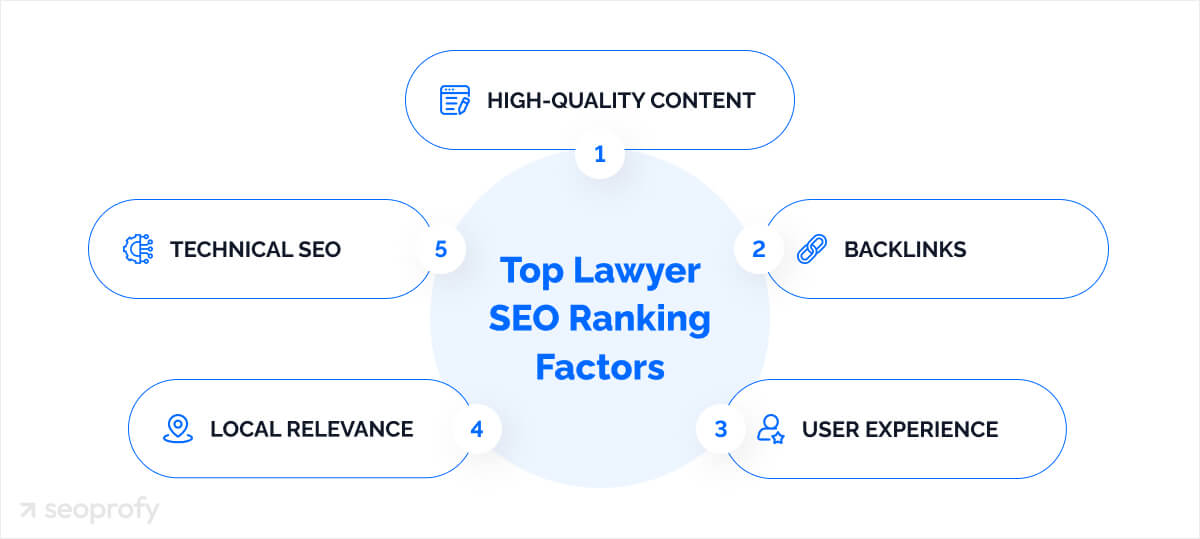
High-Quality Content
Effective attorney SEO starts with a great content marketing strategy. As you probably know, Google pays close attention to quality when it comes to choosing the websites to earn prime rankings. So, whenever you implement a law firm SEO campaign, ensure that all texts on your service pages and blog posts offer accurate, relevant, and helpful information.
So, do you want to capture your audience? First, get acquainted with our ultimate tips that can help you with content writing for law firms. Also, don’t forget to use our checklist every time you want to create another SEO-friendly piece:
- Review existing content to identify gaps and opportunities for updates
- Identify relevant keywords and create diverse content types
- Show expertise, experience, authoritativeness, and trustworthiness (E-E-A-T) with credible sources and attorney qualifications
- Adhere to legal marketing regulations and focus on user experience
- Track content performance and adjust your strategy accordingly
When it comes to the content types for law firms, you could be focusing on:
- Blog posts: Articles exploring various legal concepts
- Frequently asked questions: Dedicated FAQ pages answering common questions about legal processes, law services, the firm’s fees, etc.
- Case studies and firm updates: Content highlighting successful cases, firm news and updates, community involvement, and more
- Legal guides and ebooks: Long-form downloadable content that provides a thorough analysis of legal topics
In addition, the performance of this content in Google search results depends on how well it is optimized with keywords.
Backlinks
Your digital marketing campaign will never bring the desired results without proper link building for lawyers. This process involves the implementation of different practices focused on improving your site’s backlink profile, which is an important SEO ranking factor for attorneys. It includes links from other sites that point to your website (so-called backlinks). They inform Google about the reliability of your content. The more reputable and relevant sites that link to your web pages, the higher your pages are likely to rank.
Let’s take a look at the search engine results page (SERP) for the query “Los Angeles personal injury lawyer.” The websites that take the first positions have high domain rankings (DR) and powerful backlink profiles.
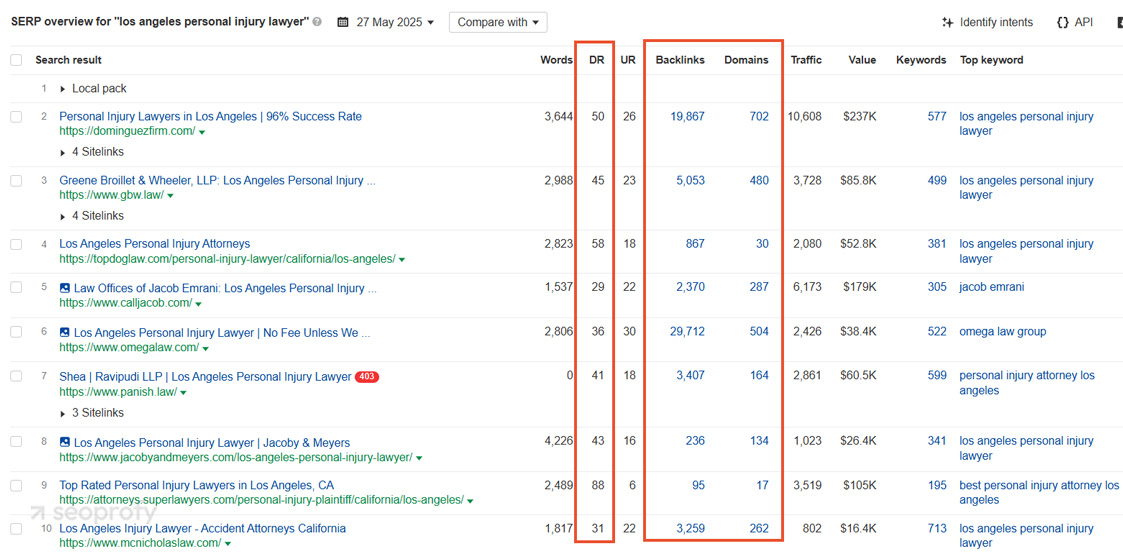
To have a chance of competing with such sites, you would have to at least reach the same results. This makes link building especially important for newly launched websites that haven’t yet established their authority.
User Experience
The user-friendliness of a website plays a crucial role in the success of SEO marketing for lawyers. Moreover, a lot of attorneys neglect this fact, so if you optimize all your site’s elements, you’ll get a strong chance of standing out from the crowd and gaining the desired keyword rankings.
While performing SEO for a law firm, it’s also essential to ensure that all pages on your website load quickly, work well on all devices, and have clear navigation. A perfect user experience in combination with valuable and exciting content can lead to the growth of your traffic and, eventually, revenue.
In addition, focus on visual elements. Consider that most lawyers’ websites have almost identical designs. This means that they won’t stand out to the user who might be browsing different sites and considering several options.
If your website loads slowly or is hard to use, your visitors will most likely quickly return to the search results, increasing your bounce rate and lowering your rankings. If they stay on your page a bit longer, poor usability might discourage them from performing a necessary action (booking a consultation, filling out a form, etc.).
Local Relevance
If you’re looking for prospective clients in a specific city or region, the implementation of efficient local SEO for lawyers is a must. First of all, ensure that your firm’s information is complete and consistent across listings and local directories. It’ll help Google know where your practice is located and who your target audience is. Plus, getting positive reviews from local clients is also critical, as many users check them before deciding whether they want to opt for your legal services.
Obtaining links from local websites is also a part of local SEO for law firms. It’s also important to make sure that location keywords and the cities or neighborhoods you serve are included in your website’s content, titles, and location landing pages.
However, Google Maps and Google Business Profile are arguably the most critical things to optimize for local relevance. In local search results, Google often shows users a “Local Pack,” a special section that shows relevant businesses on Google Maps. For example, here’s what the SERP for the “personal injury lawyer Boston” query looks like:
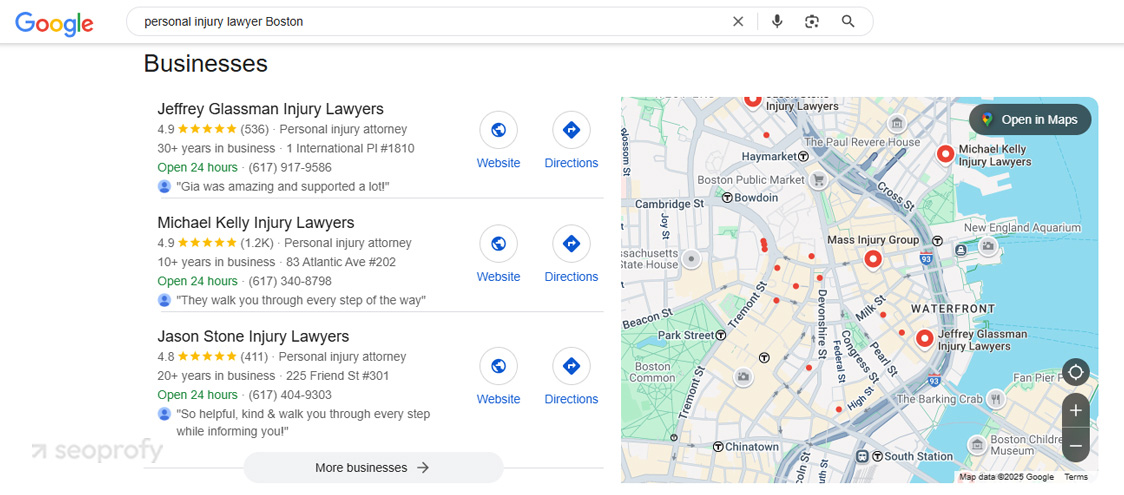
An optimized and frequently updated Google Business Profile listing is a key factor for ranking in such local results and on Google Maps.
Technical SEO
All our SEO case studies prove that the improvement of your site’s technical background is as important as growing a backlink profile and writing interesting content.
Sometimes, even a tiny issue in the website’s security, architecture, or URL structure may prevent it from getting to the top of search results. Thus, we always strongly recommend our clients to perform an efficient audit and provide them with valuable recommendations to solve these technical SEO problems:
- Duplicate content
- Keyword cannibalization
- Broken pages and redirects
- Slow loading speed
- Problems with indexing and crawling
- Missing, duplicated, or unoptimized meta tags
There are many SEO best practices to follow that can help you improve your website’s performance in all these areas. Let’s dive deeper and explore SEO tips to take your website to the first page of Google search results.
Our law firm SEO company offers fully customized strategies to help you reach your business goals:
- Increased revenue and steady flow of loyal clients
- Boosted authority in the local communities
- Enhanced client retention

How to Improve Your Law Firm SEO
SEO can provide a consistent flow of leads from organic local search traffic, but only if done right. Here are the steps you should take to ensure your SEO efforts are successful:
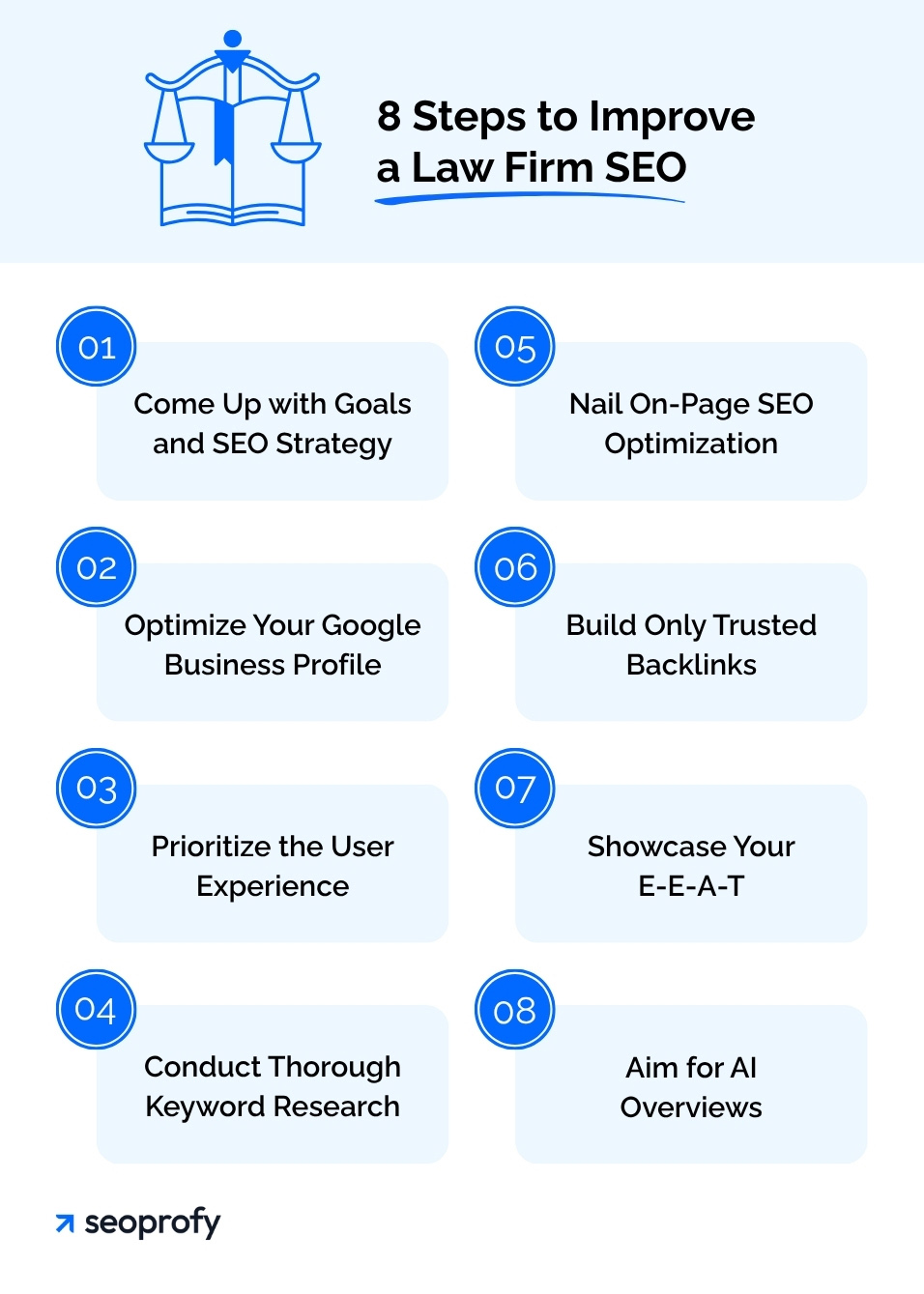
Come Up with Goals and SEO Strategy
Knowing where you go and what you expect from your law firm SEO strategy is a cornerstone of your online success. First of all, you need to consider that there is no ideal approach that perfectly works for all attorneys. The techniques you’ll use directly depend on your business goals, practice area, and audience.
Thus, you should start by setting the main tasks for your SEO campaign. For example, are you trying to increase organic traffic, improve search engine rankings, or generate more client inquiries?
Once you’ve done with the first step, it’s time to estimate the current condition of your website and pay attention to how your local competitors execute SEO. Using the best marketing tools for law firms like Google Analytics, Google Search Console, Ahrefs, and Semrush, you can easily perform comprehensive research, including:
- Analyzing your site: You need to define the core strengths and weaknesses of your website in terms of search engine optimization efforts. Evaluate how many relevant keywords are covered by the content on your landing pages and blog posts. Also, check the condition of your backlink profile to ensure there are no broken links or those obtained from unreliable sources. Finally, check the performance of your site, paying attention to the loading speed of its pages, mobile optimization, etc.
- Analyzing competitors: Exploring your opponents may provide you with valuable insights. Find out whether their blogs cover the topics that are missing on your website. It’ll be a good idea to use these ideas for your own content, trying to bring more value to potential readers. Also, you should focus on their backlink profiles as it’s a great way to discover the authoritative websites and online directories that may provide your site with valuable backlinks.
In addition, ensure that your strategy aligns with the search intent and behavior patterns of your potential clients. Knowing your audience’s pain points and interests is essential for crafting content that not only attracts their attention but also inspires them to opt for your legal services.
At the same time, you should set clear expectations and goals for your SEO campaign. It’ll help you effectively track your progress and estimate ROI. Some common KPIs for law companies include:
- The amount of organic search traffic: Remember to separate website traffic going to your main landing pages from traffic going to informational content pages. Getting visits to your service pages is ultimately more valuable for lead generation.
- Positions on targeted search queries: The ideal scenario is for your law firm’s website to appear on the first page of organic search results for phrases related to your practice. If you don’t currently rank on the first page, continue tracking the improvements. Moving up even a few spots every month indicates your law firm SEO strategy is working.
- The number of leads: This is arguably the most meaningful SEO metric for your law firm to watch closely. How many form fills, phone calls, or other signals of prospective client interest do you get each month from organic search? This metric directly shows the return on your SEO investment.
You can use the tools we’ve already mentioned to track all these metrics. With a bit of patience, appropriate adjustments to your SEO strategy, and constant monitoring, you’ll surely see improvements in your site’s performance.
Optimize Your Google Business Profile
Google Business Profile (GBP) is a free listing that allows businesses to manage their online presence across Google’s services, like Google Search and Google Maps. Having a Google Business Profile is a must for legal SEO, as it helps you to reach local clients.
Once you claim and verify ownership of the listing, be sure to fill it out with all your business details, such as:
- The official name, address, phone number, and website
- The specific cities and areas you serve
- Your hours of operation
- Your price ranges
- The payment options you accept
It’ll also be a good idea to encourage satisfied clients to leave feedback on your listing. For example, you can create a link for them to write reviews and send it after providing your services. Also, don’t forget to answer your customers’ comments to keep your GBP active. An optimized, frequently updated Google Business Profile packed with positive customer reviews lets potential clients see you’re a legitimate option before they even visit your website.
Last but not least, you can strengthen your law firm’s SEO strategy by listing your firm in attorney directories, such as Avvo, FindLaw, and Justia. This will put your practice right where your ideal clients are and increase your chances of attracting new cases.
Prioritize the User Experience
Many legal websites haven’t received a design refresh in years. While law companies certainly don’t need flashy, bright websites, a clean and modern professional look instantly elevates the user experience. In addition to a polished presentation, be certain to pay attention to mobile-friendliness and performance:
- Keep your law firm website fully responsive on both mobile and web, and make sure it adapts nicely to different screen sizes.
- Test your load times using various tools like Google PageSpeed Insights. Compressing your images will help improve your speed.
- Organize your website so visitors can easily find information. Use clear menus, visible contact buttons, and a simple structure to guide users.
- Your hero section should immediately tell visitors what to do next. Check if your CTA is clear (e.g., “Book a consultation”) and your contact info is visible.
Conducting a UX audit is one of the unobvious law firm SEO tips that can significantly boost both ratings and conversion rates. Estimate how easy it is for your visitors to use your site by taking the following steps:
- Check your website’s structure: Can a user reach the services page, contact page, or FAQ in three clicks?
- Review the copy on your site: Is it concise, informative, and easy to skim? Do headings guide users well?
- Pay attention to details that matter: Are your contact information, pricing, and the list of services easy to find?
Conduct Thorough Keyword Research
Identifying the right keywords is foundational to SEO for lawyers. When performing keyword research, take into account the following factors:
- Practice areas: Make a list of the specific legal practice areas your firm handles, like personal injury, family law, criminal defense, etc. These areas will provide a base for relevant keywords.
- Location: Since most law firms serve specific geographic areas, location-based keywords are critical. Think about cities or regions your firm covers and how potential clients search with geographic terms.
- Search intent: People’s search intent falls into two main categories: searching for legal information and searching for legal services. A person searching for “best divorce lawyers in Chicago” is more likely to hire a lawyer than someone who is just looking for “divorce laws in Illinois.”
- Search volume: Use keyword research tools like Ahrefs or Semrush to evaluate the monthly search volume for different terms. Higher volumes mean more potential website traffic targeting popular queries.
- Competition: Keyword research tools can also show how competitive certain keywords are based on how many other sites target them. More competition makes it harder to rank highly.
- Long-tail keywords: Also consider long-tail options that add more specificity, like “Chicago personal injury car accident lawyers.” These usually have lower difficulty scores and can drive the right visitors to your practice. Consider that if you’ve just launched a new website for your legal company, focusing on these specific keywords is a great option as they have lower competition and higher conversion rates.
- Related terms: Subsets of your main practice areas may uncover more relevant keywords to target as well. For example, “medical malpractice lawyer” under personal injury.
Relevant and properly targeted keywords organically woven into your content will make it easier for potential clients to find your website.
Nail On-Page SEO Optimization
Once your keyword list is finalized, it’s time to make each web page on your site as relevant as possible for these terms. This covers both the visible content elements and the behind-the-scenes technical SEO factors. Here’s how to approach it:
- Title tags and meta descriptions: These are the first things your potential clients see in local search results, so optimize them with keywords to improve click-through rates. If your firm is focused, say, on estate planning, then use “estate planning attorney” in your meta tags and description.
- Content optimization: Include your target keywords naturally within your header, body text, image descriptions, and other content elements. Be certain to avoid keyword stuffing because it can worsen readability and lead to a penalty from Google.
- Internal linking: Link internally to take visitors to other relevant pages within your website. This will help enhance user experiences and spread page authority. Moreover, if you efficiently put references to your “money” pages in your blog posts, it’ll also boost your revenue.
- Technical SEO: To ensure the efficiency of SEO for legal firms, you necessarily need to improve loading speed, use HTTPS for safety, and make your site more mobile-friendly. Also, define a proper URL structure. That way, search algorithms will consider your website reliable and friendly for users.
Build Only Trusted Backlinks
Even with stellar on-page optimization, your law firm’s website will not be able to rank well in search engines if other authoritative sites don’t link to it. However, don’t aim for a high quantity of backlinks alone. The quality and relevance of the references are way more important for successful legal SEO.
Backlinks from spammy, low-quality sites can hurt your search engine ranking if search engine bots detect link buying or other manipulative tactics. The links need to come from legitimate, respected sources related to the legal industry.
As our experience shows, most law firm sites that rank highly for different keywords don’t use aggressive link building strategies or black-hat techniques. If you want to achieve lasting results and remain competitive for a long time, you should focus on ethical link building methods, such as:
- Getting listed in trusted local directories
- Pursuing featured content or guest posting on other reputable legal blogs/publications
- Publishing research (studies, surveys, statistics, etc.) relevant to your field, which will attract backlinks naturally
- Earning media mentions and links from authoritative news outlets when showcasing firm expertise
- Having location/practice area resources linked by relevant local/regional websites
The great news is that the mentions from quality sources can also drive referral traffic as people discover and click through to your website naturally. You should also participate in legal forums or collaborate with other local businesses, which would increase your chances of getting valuable links for your law firm’s site.
Showcase Your E-E-A-T
Google’s algorithms put a big emphasis on expertise, experience, authoritativeness, and trustworthiness. These factors are especially crucial for attorneys — people want to trust the lawyers they hire to handle important, often life-changing, legal matters.
So, how can you demonstrate strong E-E-A-T signals in your SEO for lawyers strategy? Some of them will be improved if you implement the tips we mentioned earlier. Important factors are valuable content, high-quality backlinks, client testimonials, and overall website experience.
A detailed “About Us” page with extensive information about your organization is one of the best ways to improve your E-E-A-T. Attorney profiles are some of the most clicked pages of law firms’ websites, so they are the perfect place to show your credentials, like education, years of experience, awards, and recognition in your field. If you or your company’s attorneys are members of prestigious legal associations, be sure to highlight these memberships on your website, too.
In this screenshot, you can see a great example of an attorney profile from scapicchiolaw.com that demonstrates the expertise of the firm’s criminal defense attorney:
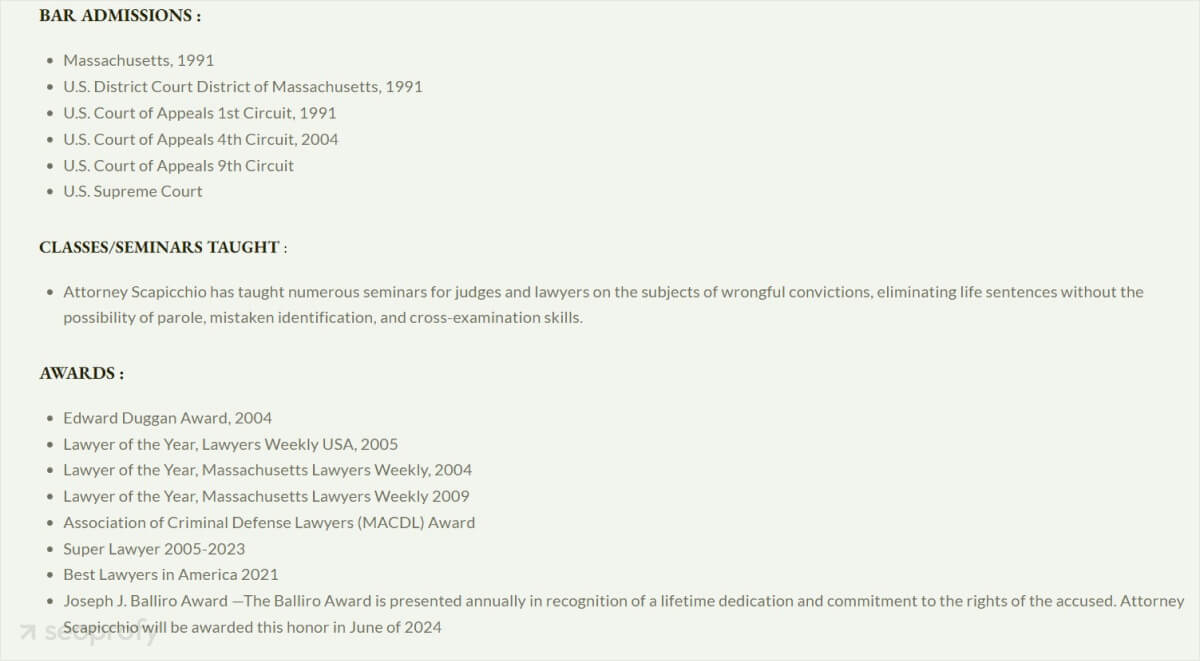
Aim for AI Overviews
After the last updates, Google often provides the answers to users’ search inquiries by showing them its AI Overviews. This information is gathered by its algorithms from top websites that cover the searched topic. For instance, here’s what an AI Overview looks like:
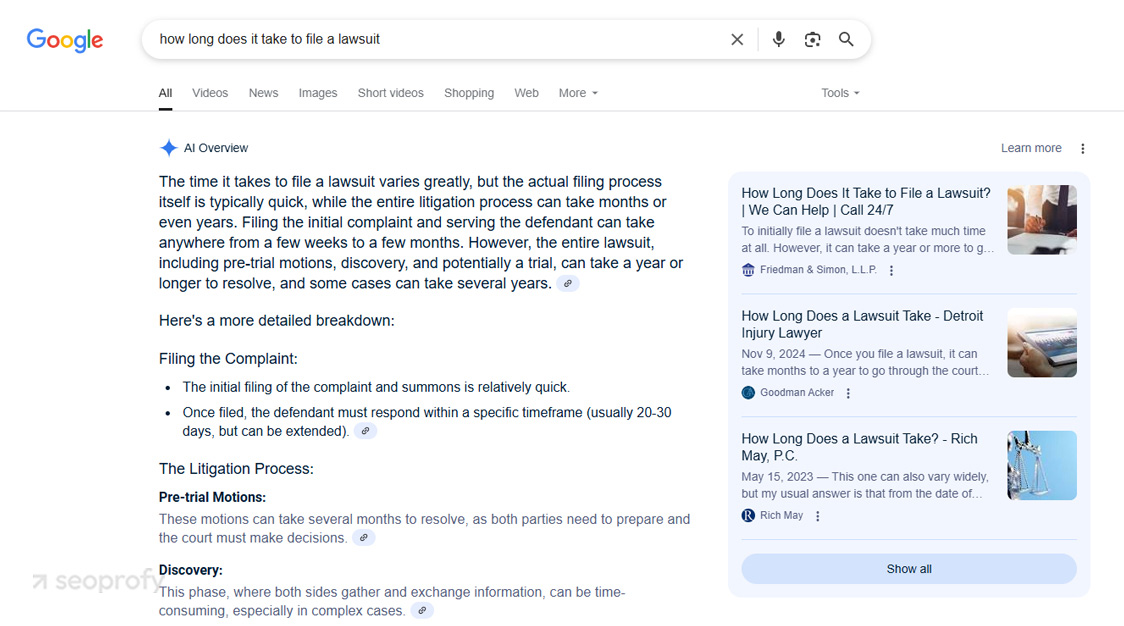
But how can you rank in AI overviews? First of all, you need to follow our time-tested tips:
- Manage your brand’s reputation: Google prioritizes sites with high domain authority and strong backlink profiles while choosing the information for its AI Overviews. It’s essential to increase your brand awareness, generate valuable and authoritative content, stay active on social media, and cooperate with popular sites related to your niche.
- Opt for direct answers: Use descriptive headers, bulleted lists, and simple tables or charts that accurately summarize important information. This provides Google with well-organized content, making it easy to scan. Eventually, it may be potentially used by its algorithms for AI Overview.
- Research the topic: Understand what people’s intent is behind each search. Are they looking for quick factual answers, steps for how to do something, comparisons, or definitions? Ensuring that your content fully meets the search intent is crucial to increasing your chances of being featured in Google’s AI Overview.
You probably wonder why a person needs to visit your site after reading the desired information directly on Google. The secret is that AI Overviews doesn’t cover the topic comprehensively. For more details on complex legal matters, people will still want to go directly to your website.
DIY SEO vs. Hiring a Lawyer SEO Expert
Taking on SEO yourself can seem appealing at first. You avoid extra marketing costs and maintain full control over the process. However, are you truly ready to face the possible challenges? You’ll need to perform keyword research, create search-friendly content, do link building, analyze data, and keep up with Google’s frequent algorithm changes.
For many legal professionals, it quickly becomes a full-time job on top of their existing casework. Moreover, when you get stuck trying to find out how to solve this or that problem, it’ll cost you a lot of time and resources.
So, how do you decide between DIY SEO and outsourcing? Let’s break down the pros and cons to help you make an informed choice:
|
DIY SEO |
Hiring an SEO Professional |
|
| Pros |
|
|
| Cons |
|
|
Now that you know these differences, the choice is yours whether to opt for law firm SEO services. In case you decide to delegate, our law firm SEO agency can be your strategic partner, focused on driving more leads and cases through search traffic. Meanwhile, you can keep delivering exceptional legal services.
Of course, hiring an SEO expert comes at a cost. This leads to another question — how much do companies typically invest in SEO for law firm websites?
How Much Do Law Firms Spend on SEO?
The variety of factors has an influence on the law firm SEO cost, including:
- Your business size and practice area: Some areas, like personal injury and corporate law, can be more competitive, and therefore, the price can also be higher.
- Your site’s current condition: If you’ve just started with a brand-new website, you’ll likely need to budget more for upfront SEO work.
- Local competition: The broader and more competitive your market, the more you’ll need to invest.
- Your goals: If you are planning to rank for highly competitive keywords, you might need a bigger budget for your SEO.
- Extra services: If you need additional tactics like link building and content creation, the costs of your SEO campaign may significantly increase.
Here’s an overview of the typical price ranges for SEO for lawyers, depending on their size, competition, and regional influence:
| Firm Size | Competition Level | Target Location | Average Monthly Budget |
| Small (up to 5 attorneys) | Low | Small towns or neighborhoods | $2.5-5K |
| Mid-size (up to 20 attorneys) | Medium | Cities or regions with a population of up to 500k residents | $5-9.5K |
| Large (more than 20 attorneys) | High | Big cities and entire states | $10-20K |
Bottom Line: Things to Keep in Mind about SEO for Lawyers
Optimizing your law firm website for search engines is critical if you want to succeed online. However, Google constantly updates its algorithms, and your competitors are likely working hard to outrank you. To appear at the top, maintain your hard-earned rankings, and keep leads flowing in, you’ll need to:
- Follow all the marketing rules and regulations for the legal field. Law firms have to be extra careful to avoid misleading claims or being too aggressive in trying to get potential clients.
- Keep growing your backlink profile by regularly generating valuable content and using efficient link building techniques.
- Always monitor your website’s performance, keep an eye on your competitors, and track the latest SEO trends so you can adapt your strategy accordingly.
If this all sounds a bit overwhelming, you don’t have to go it alone. Consider SeoProfy, an experienced law firm SEO company that specializes in marketing for legal firms. We know all the latest SEO best practices and can help you move toward SEO success.












